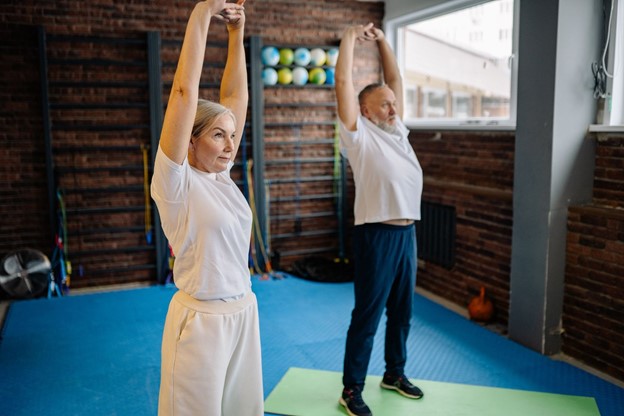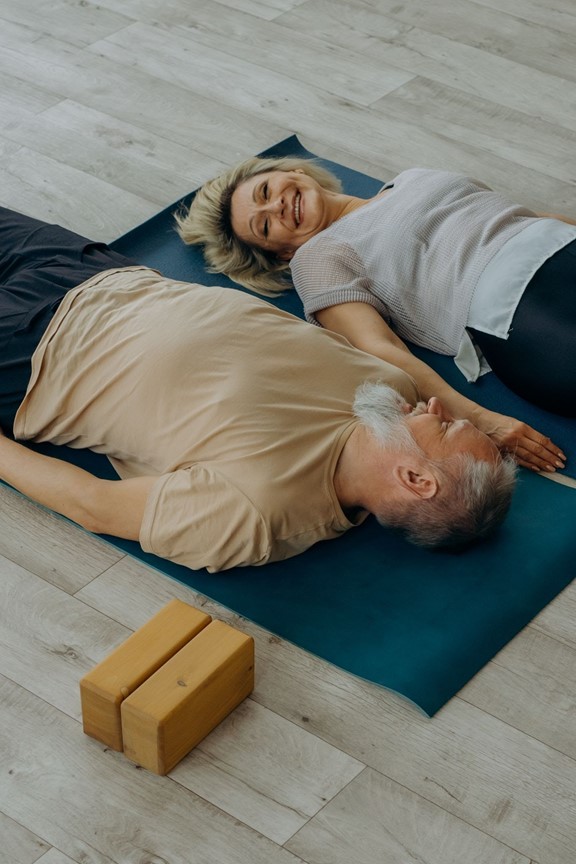5 Ways Sleep Improves Senior Health
Posted on

Maintaining your physical and mental well-being is essential for every age group, but taking active steps to improve our health becomes even more imperative as we get older.
Sleep is one of the foundations for a healthy mind and body, yet certain physical and mental obstacles may prevent someone from getting a night of peaceful shuteye. When we don’t rest well, this can impact our lives in a variety of ways. For this reason, prioritizing a good night’s rest is critical.
We’ll walk you through how better sleep can help improve the health of older adults, leading to a better quality of life in these golden years.
How Does Aging Affect Sleep?
Throughout our lifetime, our sleep needs change. While babies, children, and teens require more rest, adults only need 7-9 hours of shuteye each night, including seniors.
Sleeping habits also evolve with age. For example, teens and young adults may be more inclined to stay up late and sleep in, but according to the National Institute on Aging, older individuals typically wake up and go to bed earlier.
Sleep deprivation can be dangerous and unhealthy at any age, and there are specific risks seniors could face when they don’t get quality rest.
- Irritable moods
- Memory problems
- Depression
- Increased risk of falls or accidents
Reasons Why Sleep is Good for You
1. Better Mood

You may notice that when you don’t get enough slumber, you become grouchy. The good news is that catching up on rest should help boost your mood.
The reason for this is that sleep and mental health are closely linked to one another. Harvard Health reports that people with mental health issues such as anxiety and depression often have trouble sleeping. However, insomnia may also increase your risk of developing depression or an anxiety disorder.
2. Reduced Risk of Health Complications
Proper shuteye is also vital for your physical health. Insufficient sleep is linked to an increased risk of serious health issues, including high blood pressure, diabetes, heart problems, and stroke. Therefore, making sure you get quality rest should help lower your chances of developing these conditions.
Even just one night when you don’t get adequate rest could be harmful. A 2016 study from the University of California at Los Angeles found that a single night of partial sleep loss activated genes related to biological aging. The researchers added that insufficient rest could, therefore, increase the risk of chronic disease.

3. Helps Maintain a Healthy Weight
Dozing off is also good for your waistline since quality shuteye helps maintain a healthy weight.
When you don’t rest well, this can affect your ghrelin and leptin levels, hormones that control your appetite, which could cause you to overeat. Harvard Health adds that sleep loss also means you may be more apt to snack more and have an unhealthy diet.
Too little shuteye can also leave you with reduced energy, possibly making you less inclined to engage in physical activity, which could result in weight gain.
4. Improved Concentration and Memory
A good night’s rest is essential for keeping your brain in tip-top shape. According to Harvard Medical School, the process of learning and making memories is broken down into three categories: acquisition, consolidation, and recall.
When you’re deprived of slumber, this impacts your ability to concentrate and acquire new information. Sleep is also when we consolidate - or store - that new information, and, therefore, without proper rest, you are more likely to have trouble recalling those details.
5. Removes Harmful Toxins
Health specialists say our time asleep is also when our body performs a deep-clean and clears out harmful toxins in the brain. They specifically point to cerebrospinal fluid (CSF) flushing out those toxins, adding that they found increased waves of CSF in the brain, specifically during slow-wave, the third and deepest stage of non-REM sleep. This could signal a connection between disruptions during slow-wave sleep and cognitive decline.
Experts believe neurodegenerative diseases such as Alzheimer’s are caused by the build-up of toxins in the brain. In the case of Alzheimer’s, this toxic substance is the amyloid-Beta protein. Therefore, when you have disturbed slow-wave sleep, that could mean you also lose an important time when toxins are flushed out of the brain.
The Centers for Disease Control and Prevention reports that in 2020, about 5.8 million Americans aged 65 and older had Alzheimer’s, with that number expected to jump to 14 million by 2060.

Tips for Sleeping Better
Before using medications or supplements to help you snooze, consider implementing these natural tips for better rest that you can do on your own.
- Maintain a consistent sleep schedule
Going to bed and waking up at the same time every day - including weekends - trains your body’s biological rhythm, which should help induce sleep when it’s time for bed.
- Establish a nighttime routine to wind down
If your mind is racing with worries, it can be hard to relax, which you need to doze off. Create a nightly routine for yourself that calms you down. This could be a warm bath, meditation, yoga, or reading a book.
- No screen time before bed
Looking at the computer or any other screen before bed is not one of the recommended ways to relax. These tech devices produce a blue light that can interfere with melatonin production, a natural hormone that helps induce sleep.
- Don’t drink caffeine in the afternoon or evening
Steer clear of any caffeinated beverages later in the day, as these could make you more alert at night.
- Avoid naps later in the day
Taking an afternoon or evening siesta might seem nice, but it could leave you less tired when it’s time for bed.
- Don’t use alcohol to help you fall asleep
Alcohol may make you sleepy at first, but experts warn that once it wears off, you’re more susceptible to waking up during the night or having trouble falling back asleep.
- Avoid drinking too many liquids close to bedtime
A full bladder and constant trips to the bathroom can certainly interrupt your rest, so try to limit your water and fluid intake at night.
- Discuss your problems with a doctor or therapist
Speaking with a mental health professional or your primary care physician about your sleep issues could also be helpful. They may be able to provide a treatment plan, such as Cognitive Behavioral Therapy, that could help you overcome your insomnia. Plus, opening up to someone else about what you’re going through can help you remember that you’re not alone, and it gives you an outlet to express your concerns.
For additional tips, Sleep Advisor has a variety of guides to help you overcome different sleep disorders and other common nighttime struggles.
